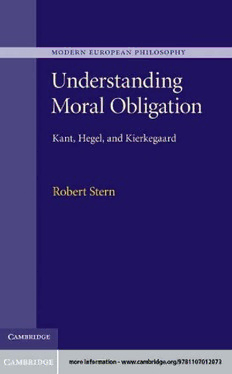
Understanding Moral Obligation Kant, Hegel, Kierkegaard PDF
Preview Understanding Moral Obligation Kant, Hegel, Kierkegaard
Understanding Moral obligation in many histories of modern ethics, Kant is supposed to have ushered in an anti-realist or constructivist turn by holding that unless we ourselves ‘author’ or lay down moral norms and values for ourselves, our auton- omy as agents will be threatened. in this book, robert stern challenges the cogency of this ‘argument from autonomy’, and claims that Kant never subscribed to it. rather, it is not value realism but the apparent obligatoriness of morality that really poses a challenge to our autonomy: how can this be accounted for without taking away our freedom? the debate the book focuses on therefore concerns whether this obligato- riness should be located in ourselves (Kant), in others (Hegel) or in god (Kierkegaard). stern traces the historical dialectic that drove the development of these respective theories, and clearly and sympathetic- ally considers their merits and disadvantages; he concludes by arguing that the choice between them remains open. robert stern is Professor of Philosophy at the University of sheffield. He is the author of Hegel, Kant and the Structure of the Object (1990), Transcendental Arguments and Scepticism: Answering the Question of Justification (2000), Hegel and the ‘Phenomenology of Spirit’ (2002), and Hegelian Metaphysics (2009). He is editor of G.W.F. Hegel: Critical Assessments (1993) and Transcendental Arguments: Problems and Prospects (1999). Modern eUroPean PHilosoPHy General Editor Wayne Martin, University of Essex Advisory Board sebastian gardner, University College, London beatriCe Han-Pile, University of Essex Hans slUga, University of California, Berkeley Some recent titles Michelle grier, Kant’s Doctrine of Transcendental Illusion Henry allison, Kant’s Theory of Taste allen speight, Hegel, Literature, and the Problem of Agency J. M. bernstein, Adorno Will dudley, Hegel, Nietzsche, and Philosophy taylor Carman, Heidegger’s Analytic douglas Moggach, The Philosophy and Politics of Bruno Bauer rüdiger bubner, The Innovations of Idealism Jon stewart, Kierkegaard’s Relations to Hegel Reconsidered Michael Quante, Hegel’s Concept of Action Wolfgang detel, Foucault and Classical Antiquity robert M. Wallace, Hegel’s Philosophy of Reality, Freedom, and God Johanna oksala, Foucault on Freedom béatrice longuenesse, Kant on the Human Standpoint Wayne Martin, Theories of Judgment Heinrich Meier, Leo Strauss and the Theologico-Political Problem otfried Höffe, Kant’s Cosmopolitan Theory of the Law and Peace béatrice longuenesse, Hegel’s Critique of Metaphysics rachel Zuckert, Kant on Beauty and Biology andrew bowie, Music, Philosophy and Modernity Paul redding, Analytic Philosophy and the Return of Hegelian Thought Kristin gjesdal, Gadamer and the Legacy of German Idealism Jean-Christophe Merle, German Idealism and the Concept of Punishment sharon Krishek, Kierkegaard on Faith and Love nicolas de Warren, Husserl and the Promise of Time benjamin rutter, Hegel on the Modern Arts anne Margaret baxley, Kant’s Theory of Virtue david James, Fichte’s Social and Political Philosophy espen Hammer, Philosophy and Temporality from Kant to Critical Theory Understanding Mor al obligation Kant, Hegel, Kierkegaard robert stern University of Sheffield cambridge university press Cambridge, new york, Melbourne, Madrid, Cape town, singapore, são Paulo, delhi, tokyo, Mexico City Cambridge University Press the edinburgh building, Cambridge cb2 8ru, UK Published in the United states of america by Cambridge University Press, new york www.cambridge.org information on this title: www.cambridge.org/9781107012073 © robert stern 2012 this publication is in copyright. subject to statutory exception and to the provisions of relevant collective licensing agreements, no reproduction of any part may take place without the written permission of Cambridge University Press. First published 2012 Printed in the United Kingdom at the University Press, Cambridge A catalogue record for this publication is available from the British Library Library of Congress Cataloguing in Publication data stern, robert, 1962– Understanding moral obligation : Kant, Hegel, Kierkegaard / robert stern. p. cm. – (Modern european philosophy) includes bibliographical references and index. isbn 978-1-107-01207-3 1. duty. 2. responsibility. 3. Kant, immanuel, 1724–1804. 4. Hegel, georg Wilhelm Friedrich, 1770–1831. 5. Kierkegaard, søren, 1813–1855. i. title. bj1451.s69 2012 170.92′2–dc23 2011039382 isbn 978-1-107-01207-3 Hardback Cambridge University Press has no responsibility for the persistence or accuracy of Urls for external or third-party internet websites referred to in this publication, and does not guarantee that any content on such websites is, or will remain, accurate or appropriate. Ode to Duty William Wordsworth stern daughter of the Voice of god! o duty! if that name thou love, Who art a light to guide, a rod to check the erring, and reprove; thou, who art victory and law When empty terrors overawe; From vain temptations dost set free; and calm’st the weary strife of frail humanity! Kind Of An Ode To Duty ogden nash o duty, Why hast thou not the visage of a sweetie or a cutie? Why displayest thou the countenance of the kind of conscien- tious organizing spinster that the minute you see her you are aginster? Why glitter thy spectacles so ominously? Why art thou clad so abominously? Why are thou so different from Venus and why do thou and i have so few interests mutually in common between us? Why art thou fifty per cent martyr and fifty-one per cent tartar? Contents Acknowledgements page ix List of references and abbreviations xi introduction 1 Part i Kant 5 1 Kant, moral realism, and the argument from autonomy 7 2 the argument from autonomy and the problem of 41 moral obligation 3 Kant’s solution to the problem of moral obligation 68 Part ii Hegel 101 4 Hegel’s critique of Kant (via schiller) 103 5 Hegel’s solution to the problem of moral obligation 148 Part iii Kierkegaard 171 6 Kierkegaard’s critique of Hegel 173 7 Kierkegaard’s solution to the problem of moral obligation 204 Conclusion: From Kant to Kierkegaard – and back again? 220 Bibliography 255 Index 273 vii
